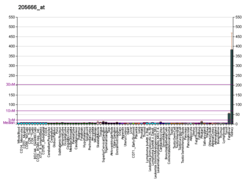Flavin containing monooxygenase 1
Dimethylaniline monooxygenase [N-oxide-forming] 1 is an enzyme that in humans is encoded by the FMO1 gene.[5]
Metabolic N-oxidation of the diet-derived amino-trimethylamine (TMA) is mediated by flavin-containing monooxygenase and is subject to an inherited FMO3 polymorphism in humans resulting in a small subpopulation with reduced TMA N-oxidation capacity resulting in fish odor syndrome Trimethylaminuria. Three forms of the enzyme, FMO1 found in fetal liver, FMO2 found in adult liver, and FMO3 are encoded by genes clustered in the 1q23-q25 region. Flavin-containing monooxygenases are NADPH-dependent flavoenzymes that catalyzes the oxidation of soft nucleophilic heteroatom centers in xenobiotics such as pesticides and drugs.[5]
References
- GRCh38: Ensembl release 89: ENSG00000010932 - Ensembl, May 2017
- GRCm38: Ensembl release 89: ENSMUSG00000040181 - Ensembl, May 2017
- "Human PubMed Reference:". National Center for Biotechnology Information, U.S. National Library of Medicine.
- "Mouse PubMed Reference:". National Center for Biotechnology Information, U.S. National Library of Medicine.
- "Entrez Gene: FMO1 flavin containing monooxygenase 1".
Further reading
- Hines RN, Cashman JR, Philpot RM, et al. (1994). "The mammalian flavin-containing monooxygenases: molecular characterization and regulation of expression". Toxicol. Appl. Pharmacol. 125 (1): 1–6. doi:10.1006/taap.1994.1042. PMID 8128486.
- Cashman JR (2004). "The implications of polymorphisms in mammalian flavin-containing monooxygenases in drug discovery and development". Drug Discov. Today. 9 (13): 574–581. doi:10.1016/S1359-6446(04)03136-8. PMID 15203093.
- Dolphin C, Shephard EA, Povey S, et al. (1991). "Cloning, primary sequence, and chromosomal mapping of a human flavin-containing monooxygenase (FMO1)". J. Biol. Chem. 266 (19): 12379–85. PMID 1712018.
- Phillips IR, Dolphin CT, Clair P, et al. (1995). "The molecular biology of the flavin-containing monooxygenases of man". Chem. Biol. Interact. 96 (1): 17–32. doi:10.1016/0009-2797(94)03580-2. PMID 7720101.
- Lawton MP, Cashman JR, Cresteil T, et al. (1994). "A nomenclature for the mammalian flavin-containing monooxygenase gene family based on amino acid sequence identities". Arch. Biochem. Biophys. 308 (1): 254–257. doi:10.1006/abbi.1994.1035. PMID 8311461.
- Shephard EA, Dolphin CT, Fox MF, et al. (1993). "Localization of genes encoding three distinct flavin-containing monooxygenases to human chromosome 1q". Genomics. 16 (1): 85–89. doi:10.1006/geno.1993.1144. PMID 8486388.
- Hay JC, Chao DS, Kuo CS, Scheller RH (1997). "Protein interactions regulating vesicle transport between the endoplasmic reticulum and Golgi apparatus in mammalian cells". Cell. 89 (1): 149–158. doi:10.1016/S0092-8674(00)80191-9. PMID 9094723.
- Yeung CK, Lang DH, Thummel KE, Rettie AE (2000). "Immunoquantitation of FMO1 in human liver, kidney, and intestine". Drug Metab. Dispos. 28 (9): 1107–11. PMID 10950857.
- Washio T, Arisawa H, Kohsaka K, Yasuda H (2002). "Identification of human drug-metabolizing enzymes involved in the metabolism of SNI-2011". Biol. Pharm. Bull. 24 (11): 1263–1266. doi:10.1248/bpb.24.1263. PMID 11725960.
- Koukouritaki SB, Simpson P, Yeung CK, et al. (2002). "Human hepatic flavin-containing monooxygenases 1 (FMO1) and 3 (FMO3) developmental expression". Pediatr. Res. 51 (2): 236–243. doi:10.1203/00006450-200202000-00018. PMID 11809920.
- Strausberg RL, Feingold EA, Grouse LH, et al. (2003). "Generation and initial analysis of more than 15,000 full-length human and mouse cDNA sequences". Proc. Natl. Acad. Sci. U.S.A. 99 (26): 16899–16903. doi:10.1073/pnas.242603899. PMC 139241. PMID 12477932.
- Furnes B, Feng J, Sommer SS, Schlenk D (2003). "Identification of novel variants of the flavin-containing monooxygenase gene family in African Americans". Drug Metab. Dispos. 31 (2): 187–193. doi:10.1124/dmd.31.2.187. PMID 12527699.
- Attar M, Dong D, Ling KH, Tang-Liu DD (2003). "Cytochrome P450 2C8 and flavin-containing monooxygenases are involved in the metabolism of tazarotenic acid in humans". Drug Metab. Dispos. 31 (4): 476–481. doi:10.1124/dmd.31.4.476. PMID 12642475.
- Hines RN, Luo Z, Hopp KA, et al. (2003). "Genetic variability at the human FMO1 locus: significance of a basal promoter yin yang 1 element polymorphism (FMO1*6)". J. Pharmacol. Exp. Ther. 306 (3): 1210–1218. doi:10.1124/jpet.103.053686. PMID 12829732.
- Ota T, Suzuki Y, Nishikawa T, et al. (2004). "Complete sequencing and characterization of 21,243 full-length human cDNAs". Nat. Genet. 36 (1): 40–45. doi:10.1038/ng1285. PMID 14702039.
- Gerhard DS, Wagner L, Feingold EA, et al. (2004). "The status, quality, and expansion of the NIH full-length cDNA project: the Mammalian Gene Collection (MGC)". Genome Res. 14 (10B): 2121–2127. doi:10.1101/gr.2596504. PMC 528928. PMID 15489334.
- Zhang J, Cashman JR (2006). "Quantitative analysis of FMO gene mRNA levels in human tissues". Drug Metab. Dispos. 34 (1): 19–26. doi:10.1124/dmd.105.006171. PMID 16183778.
- Bartsch M, Gobbato E, Bednarek P, et al. (2006). "Salicylic acid-independent ENHANCED DISEASE SUSCEPTIBILITY1 signaling in Arabidopsis immunity and cell death is regulated by the monooxygenase FMO1 and the Nudix hydrolase NUDT7". Plant Cell. 18 (4): 1038–1051. doi:10.1105/tpc.105.039982. PMC 1425861. PMID 16531493.
This article is issued from Wikipedia. The text is licensed under Creative Commons - Attribution - Sharealike. Additional terms may apply for the media files.




